Muscular System
The muscular system is a network of tissues that allows the body to move and function. It is made up of muscles, which are responsible for the movement of various body parts, and tendons, which connect muscles to bones.
Types of Muscles
There are three types of muscles in the body:
- Skeletal Muscles: These are attached to bones and are responsible for voluntary movements such as walking, running, and lifting weights.
- Smooth Muscles: These are found in the walls of internal organs and blood vessels, and are responsible for involuntary movements such as digestion and breathing.
- Cardiac Muscles: These are found in the heart and are responsible for pumping blood throughout the body.
Functions of the Muscular System
The muscular system performs several important functions in the body:
- Movement: Muscles enable the body to move and perform various activities.
- Posture and Stability: Muscles help maintain posture and provide stability to the body.
- Heat Production: Muscles generate heat to maintain body temperature.
- Protection of Organs: Muscles surround and protect internal organs.
Study Guide
To better understand the muscular system, here are some key points to focus on:
- Identify and label the different types of muscles in the body.
- Learn the functions of each type of muscle and their roles in the body.
- Understand the structure of muscles, including the arrangement of muscle fibers and the role of tendons.
- Explore how muscles work together to produce movement and maintain body functions.
- Examine the importance of exercise and proper nutrition for maintaining a healthy muscular system.
By studying these key points, you will gain a comprehensive understanding of the muscular system and its significance in the human body.
[Muscular System] Related Worksheets and Study Guides:
.◂Science Worksheets and Study Guides First Grade. Living and nonliving things
Study Guide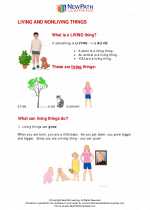 Living and nonliving things
Living and nonliving things  Activity Lesson
Activity Lesson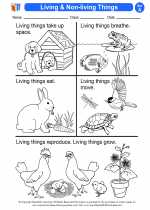 Living & Non-living Things
Living & Non-living Things  Worksheet/Answer key
Worksheet/Answer key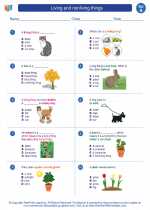 Living and nonliving things
Living and nonliving things  Worksheet/Answer key
Worksheet/Answer key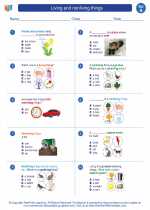 Living and nonliving things
Living and nonliving things  Worksheet/Answer key
Worksheet/Answer key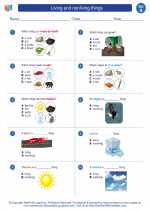 Living and nonliving things
Living and nonliving things  Worksheet/Answer key
Worksheet/Answer key Living and nonliving things
Living and nonliving things  Vocabulary/Answer key
Vocabulary/Answer key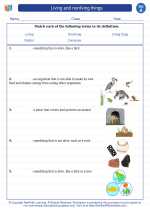 Living and nonliving things
Living and nonliving things 

 Activity Lesson
Activity Lesson
 Worksheet/Answer key
Worksheet/Answer key
 Worksheet/Answer key
Worksheet/Answer key
 Worksheet/Answer key
Worksheet/Answer key
 Worksheet/Answer key
Worksheet/Answer key
 Vocabulary/Answer key
Vocabulary/Answer key

The resources above cover the following skills:
Concepts of Life Science (SC1, SC2, SC3)
The student demonstrates an understanding that all organisms are linked to each other and their physical environments through the transfer and transformation of matter and energy by identifying and sorting examples of living and non-living things in the local environment. (L)